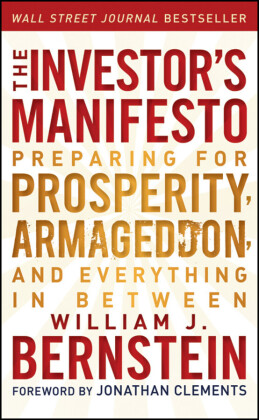Midpack
Give me a museum and I'll fill it. (Picasso) Give me a forum ...
Dr Bernstein was/is still my go to financial guru (Four Pillars is still the basis of my IP), though his pendulum regarding (equity) investing later in life swung toward the conservative to a greater extent than I expected after most of his high net worth clients couldn't stick with his guidance during the 2008-09 financial meltdown. Seems timely to share excerpts from his Preface in the book he wrote in 2010 after that experience. I will be re-reading the book myself starting today.

But if that leads you to wonder if you shouldn't actively participate in how your investments are managed...William J. Bernstein said:The financial meltdown of 2008-2009 drastically changed the investment landscape, and if there was ever a time to leapfrog my previous books, it is now. [The Intelligent Asset Allocator & The Four Pillars of Investing]
As in the depths of the Great Depression, there are now generous returns to be had for the brave, the disciplined, the liquid. If there was ever a time to own a prudent portfolio that includes equities for the long term, it is now. [Note he is writing for investors of all ages here. His advice for 20-somethings is not the same as for retirees.]
Successful investing requires a skills set that very few people possess. This is difficult for me to admit; after all, I have written two books premised on the idea that anyone, given the proper tools, can turn the trick.
Successful investors need four abilities. First, they must possess and interest in the process. It is no different from carpentry, gardening or parenting. If money management is not enjoyable, then a lousy job inevitably results, and, unfortunately, most people enjoy finance about as much as they do root canal work.
Second, investors need more than a bit of math horsepower, far beyond simple arithmetic and algebra, or even the ability to manipulate a spreadsheet. Mastering the basics of investment theory requires an understanding of the laws or probability and working knowledge of statistics. Sadly, as one financial columnist explained to me more than a decade ago, fractions are a stretch for 90 percent of the population.
Third, investors need a firm grasp of financial history, from the South Sea Bubble to the Great Depression. Alas, as we shall soon see, this is something that even professionals have real trouble with.
Even if investors possess all three of these abilities, it will all be for naught if they do not have a fourth one: the emotional discipline to execute their planned strategy faithfully, come hell, high water, or the apparent end of capitalism as we know it. "Stay the course": It sounds so easy when uttered at high tide. Unfortunately, when the water recedes, it is not.
I expect no more than 10 percent of the population passes muster on each of the above counts. This suggests that as few as one person in 10,000 (10 percent to the fourth power) has the full skill set. Perhaps I am being overly pessimistic. After all, these four abilities may not be entirely independent: if someone is smart enough, it is also more likely he or she will be interested in finance and be driven to delve into financial history.
But even the most optimistc assumptions - increase the odds at any of the four steps to 30 percent and link them - suggests no more than a few percent of the population is qualified to manage their own money.
William J. Bernstein said:Chapters 5 and 6 focus on dealing with the investment industry to execute the investment strategies devised in the previous chapters.
I emphasize three main principles: first, to not be too greedy; second, to diversify as widely as possible; and third, to always be wary of the investment industry. People do not seek employment in investment banks, brokerage houses, and mutual fund companies with the same motivations as those who choose to work in fire departments or elementary schools. Whether investors know it or not, they are engaged in an ongoing zero-sum, life-and-death struggle with piranhas, and if rigorous precautions are not taken, the financial services industry will strip investors of their wealth faster than they can say "Bernie Madoff."

Last edited:
